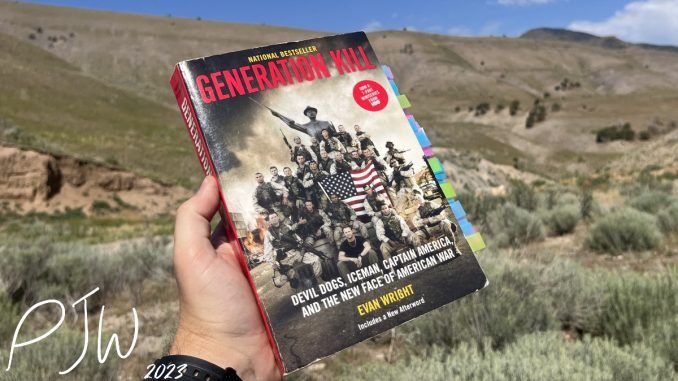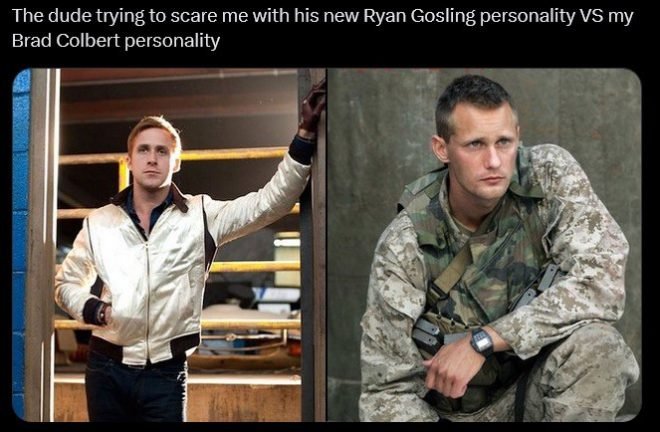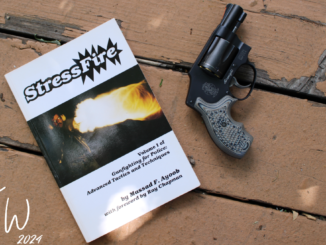
Generation Kill is the 2004 book written by Evan Wright. Wright was a journalist for Rolling Stone, and was embedded with the 1st Reconnaissance Battalion of the United States Marine Corps during the Invasion of Iraq in 2003. 1st Recon was part of the spearhead into Iraq, and Wright was able to document the events, and the mindsets of the men that partook. However, I did not begin learning about this via Wright’s book, but rather via the HBO miniseries of the same name. Here, I’ll be talking about why the book is so great, and how the miniseries manages to capture that element too.
Setting the Stage
GK begins in March of 2003. While the war in Iraq has yet to start, 1st Recon is preparing just across the border in Kuwait. Wright begins the book proper (after the prologue) at Camp Mathilda, the USMC base of operations in Kuwait. At Mathilda, we (and Wright) are introduced to our band of characters that will persist till the end of the book.
Generation Kill is a very personal book. Rather than try to be a historical overview, we get to be inside the Humvees at the spearhead of the invasion of Iraq. Wright took a lot of the conversations between Marines verbatim, and put them in the book. As such, GK reads a lot more like a series of conversations rather than a standard book.
Wright was in one of the lead Humvees in 1st Recon’s Bravo Company, and as such, the men of this Humvee are our core characters. Sgt. Brad “Iceman” Colbert, leader of the Humvee, Cpl. Ray Pearson is the driver, and we’ve got a cast of men that float around the vehicle. GK reads a lot like bros on a roadtrip, except the roadtrip involves invading a country, getting shot at, and schwacking people.
While we have our main characters, there are plenty of other Marines that get brought into the book too. From enlisted men to officers, GK discusses the day-to-day elements of the 2003 Invasion.
Pushing Off
After a little time in Kuwait, we jump into the chaotic invasion of Iraq. There are plenty of stereotypes of the USMC being the “hand me down” gear branch, and GK holds that trope up. The Humvees of 1st Recon are rickety, and many have had money dumped into them by the men driving them. There is a constant lack of supplies, such as batteries for night vision devices. On top of supply issues, 1st Recon’s Alpha/Bravo/Charlie companies are invading Iraq with a single translator. All of that sounds like a recipe for disaster.
Despite the logistical issues, 1st Recon hit Iraq hard. The early to middle sections of GK discuss the day-to-day events of late March and early April of 2003. 1st Recon is acting as shock troopers, pushing from town to town. A lot of the book is incredibly visual, discussing the refugees, combat, and dead civilians that 1st Recon encounters. Now, it may be pretentious to say this, but the book kind of reads like non-fiction Hemingway. When reading GK, you can really picture the events unfolding, hear the sounds, and smell the smells. Sure, the sounds are gunfire and explosions, and the smells are taint sweat, rotting bodies, and Charms candy, but you can really imagine the situations.
While the Marines are encountering a combination of little resistance and a ton of fighting, a lot of the conflict is internal to 1st Recon.
Generation Kill & the Chain of Command
Much of GK breaks down to the issues between the enlisted men, and the officers above them. Throughout the book, we see officers that are generally incompetent, and their men losing faith in their decision making processes. We also see the enlisted men coming to support the officers who are competent.
For Bravo Company, this boils down to Lt. Nate Fick, and the two captains above him, “Captain America” and “Encino Man”. Lt. Fick is respected by his men, as he listens to them, and looks to them for advice since they have more combat experience than he has. Meanwhile, “Captain American” & “Encino Man” are bumbling through orders, and generally seem incompetent. While many officers are mentioned in GK, much of Bravo Company seems to resent the captains above Lt. Fick.

Throughout the book, we see Lt. Fick put the well being of his men and clarity of the mission at the forefront. We see the two Bravo captains give risky or incompetent orders, as they are trying to look good to their superiors. At a major point in the book, we see “Encino Man” attempt to call in a danger close (within 600 meter) artillery strike on an RPG team. The enlisted men and Lt. Fick try to clarify to “Encino Man” that they already destroyed the RPG team, and that the strike is useless. While they explain this, “Encino Man” has no idea what a danger close strike is, and the company is saved by their captain’s incompetence, as he calls in the incorrect fire mission order.
We get a personal look into the internal struggles of 1st Recon, along with the complications of invading a country packed full of civilians.
Going Even Deeper
GK is a very emotional book. By this, I mean that we get an insight into the feelings of the men in 1st Recon, and the people that they meet along the way. The men of 1st Recon have a strong “Warrior Mindset”, however many start to feel the toll of seeing dead civilians and children as the invasion pushes on. At the onset of the book, the Marines view the Iraqi people as sort of an alien race, much different than them. However, as the war progresses, we see the men of 1st Recon change, and realize that the Iraqis aren’t all that different from them.
During a raid on an airfield, LCpl. Trombley shoots two boys tending to camels. Their mothers drag them to the 1st Recon encampment, where Navy Corpsman “Doc Bryan” performs aid to the boys. One of the boys needs urgent surgery, or he’ll die. Lt. Fick and Sgt. Colbert go with Doc Bryan to take the boy to the command tent for the battalion. Their goal is to bring the dying boy before Lt.Col Stephen “Godfather” Ferrando, to guilt him to evacuate the boy to a proper field hospital. Godfather does it, explaining that this is not the norm, as they are far behind enemy lines.
The point of the anecdote is to show how men who train to kill, want to kill, and are killing can still have compassion despite their jobs. We also get a look into the desires of the Marines. They want to do a job well, while combatting boredom, fatigue, and lack of supplies. Men go hungry, long for loved ones or sexual contact, or just want some peace and quiet so they can poop. The “Combat Jack” is referenced a lot here too, the idea of masturbating while in a warzone to calm one’s nerves. Complaining about not getting cheese in an MRE, or people keeping unlucky Charms candy in the Humvee come up too. The dialogue and discussions really make GK seem real.
Dialogue In Generation Kill
Due to the nature of how GK was written, it is very conversational. As such, people say things that are incredibly unfiltered, but intensely real. Whether it is Cpl. Pearson talking about the “pussy infrastructure of Iraq”, or Lt. Fick joking with Wright about the relative safety of Iraq while ducking behind a vehicle, the dialogue is perfect. Iceman signing Gordon Lightfoot’s Sundown is something that I think about pretty often too.

This leads right into discussing the HBO miniseries. Generation Kill as a miniseries is one of the best adaptations of a book that I’ve ever found. As someone who was both a fan of Band of Brothers and The Pacific, GK does the adaption better. The book is delivered to film very well, with many conversations and scenes playing out identically to the book. Casting for characters is great, as lines are delivered naturally too. In much of the book, our crew are singing songs in the Humvee to pass time, and that is replicated in the miniseries too. If you aren’t a reader (you should be), the HBO miniseries is nearly as good as reading the book.
Because of the verbatim nature of recording conversations, Wright really makes the book come to life.
End of Operations
As our band of men pushes further into Iraq, they learn that their overall mission was actually a decoy plan, to pull heat away from Bagdad. At this point in the book, the combat is starting to settle down a bit, and the men are starting to feel the fatigue of weeks on the road, with little sleep and much combat. The men move from a direct combat role, to a more policing role. They are moved to Bagdad, and begin patrolling neighborhoods, and providing aid. However, they are moved from neighborhood to neighborhood each day, so their impact is nearly nil. The book concludes in May of 2003, with Wright leaving while 1st Recon is camped at the old Iraqi barracks at Ad Diwaniyah.
Wright would publish the first version of GK in Rolling Stone, as a series of articles. The following year, he published the works as the completed book. The copy I have is an updated edition that was release after the HBO miniseries came out. It features an afterward, in which Wright discusses how his assumptions about the war were incorrect.
I’ve purposefully been a bit light on the specific details of the book, as I think you should read it.
The Generation Kill Recommendation
I would very much recommend reading Generation Kill. It is a time capsule of the start of the 2003 war in Iraq, along with one of the best examples of life in the modern US military in a warzone. While the source material is 20 years old, it is still very real and relevant. It’s a book that will make you feel like you’re there. For the good, the bad, the funny, and the sad times. GK very much reminded me of Eugene Sledge’s memoirs, in the sense that both are very visceral, and very personal.
On the topic of the HBO miniseries, I think it is one of the best ones that they’ve produced. While I love the similar HBO war miniseries, Generation Kill is just the realest one that I’ve seen. It’s also incredibly quotable, which is something I really enjoy. I’ve put a quotes section in some of my prior book reviews, but then it would be longer than the rest of the article here.

Go read Generation Kill, and watch the miniseries too. You’ll have a very enjoyable time.
Book Recommendations
Generation Kill is a great read, and is easy to find used online. I’d easily recommend reading it, and checking out the HBO miniseries too.
Check out the following previously reviewed books:
- Shattered Sword: The Untold Story of the Battle of Midway – Jon Parshall & Tony Tully
- The Last Stand of the Tin Can Sailors – James D. Hornficsher
- With the Old Breed: At Peleliu and Okinawa – E.B. Sledge
- China Marine: An Infantry’s Life After World War II – E.B. Sledge
- New Rules For War: Victory In The Age Of Durable Disorder – Sean McFate
- Black Hawk Down – Mark Bowden





Be the first to comment